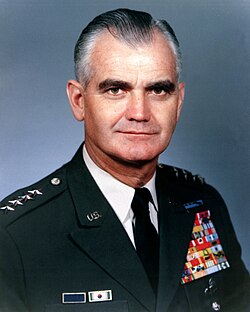William Westmoreland Quote
Related Quotes
Let my silence grow with noise as pregnant mothers grow with life. Let my silence permeate these walls as sunlight permeates a home. Let the silence rise from unwatered graves and craters left by bomb...
Kamand Kojouri
Tags:
abuse, abused, activism, activism poems, activist, amnesty, bellies, bombs, broken hearts, coming together
Attempts to locate oneself within history are as natural, and as absurd, as attempts to locate oneself within astronomy. On the day that I was born, 13 April 1949, nineteen senior Nazi officials were...
Christopher Hitchens
Tags:
alcohol, alcoholism, andrei gromyko, antisemitism, astrology, astronomy, beijing, birth, birthdays, breastfeeding
About William Westmoreland
William Childs Westmoreland (26 March 1914 – 18 July 2005) was a United States Army general, most notably the commander of United States forces during the Vietnam War from 1964 to 1968.
He served as Chief of Staff of the United States Army from 1968 to 1972.
In Vietnam, Westmoreland adopted a strategy of attrition against the Viet Cong and the North Vietnamese Army, to drain them of manpower and supplies. He also made use of the United States' superiority in artillery and air power, employed in tactical confrontations and in relentless strategic bombing of North Vietnam.
As time went on and success was not gained, public support for the war diminished, especially after the Battle of Khe Sanh and the Tet Offensive in 1968. When he was reassigned as Army Chief of Staff, United States military forces in Vietnam had reached a peak of 535,000 personnel.
Westmoreland's strategy was ultimately politically and militarily unsuccessful. Growing United States casualties and the draft undermined United States support for the war, while large-scale casualties among non-combatants weakened South Vietnamese support.
He served as Chief of Staff of the United States Army from 1968 to 1972.
In Vietnam, Westmoreland adopted a strategy of attrition against the Viet Cong and the North Vietnamese Army, to drain them of manpower and supplies. He also made use of the United States' superiority in artillery and air power, employed in tactical confrontations and in relentless strategic bombing of North Vietnam.
As time went on and success was not gained, public support for the war diminished, especially after the Battle of Khe Sanh and the Tet Offensive in 1968. When he was reassigned as Army Chief of Staff, United States military forces in Vietnam had reached a peak of 535,000 personnel.
Westmoreland's strategy was ultimately politically and militarily unsuccessful. Growing United States casualties and the draft undermined United States support for the war, while large-scale casualties among non-combatants weakened South Vietnamese support.
